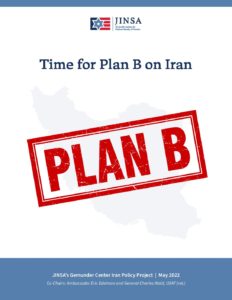Time for Plan B on Iran
The first step toward recovery is admitting you have a problem. For more than a year, President Joe Biden, with undue patience and good faith, has offered Iran mutual reentry into the 2015 Joint Comprehensive Plan of Action (JCPOA) nuclear deal, in the hopes this might lead to a “longer, stronger” agreement. This policy has now clearly failed. It is time for the Biden administration to acknowledge that failure and adopt a “Plan B”: a new strategy of comprehensive pressure on Tehran, particularly focused on strengthening the capabilities of U.S. regional partners to defend themselves against Iran.
There can be no return to the JCPOA. Even if some agreement based on the 2015 deal could be reached – an increasingly unlikely prospect given Iranian intransigence and congressional concerns – it would necessarily be shorter and weaker than the original.
If the Biden administration wants to deliver on the president’s “unshakeable commitment to prevent Iran from acquiring a nuclear weapon,” it will have to accept the failure of its original policy, declare the JCPOA dead and move on to “Plan B,” a comprehensive pressure strategy. It is most important that the United States set very clear redlines for further Iranian nuclear advancement and regional aggression as well as backing them up with visible increases to U.S. military readiness in the Middle East. However, given the lack of credibility of the U.S. military option against Iran, the Biden administration should also work with regional partners – especially Israel – to boost their military capabilities and deterrent effect against Iran.
Iran Policy Project Co-Chairmen
Ambassador Eric Edelman
Former Under Secretary of Defense for Policy
General Charles Wald, USAF (ret.)
Former Deputy Commander of United States European Command
Iran Policy Project Members
Elliot Abrams
Senior Fellow for Middle Eastern Studies, Council on Foreign Relations
VADM John Bird, USN (ret.)
Former Commander, U.S. Seventh Fleet
General James Conway, USMC (ret.)
Former Commandant of the Marine Corps
Lt Gen David Deptula, USAF (ret.)
Former Deputy Chief of Staff for Intelligence, Surveillance and Reconnaissance, U.S. Air Force Headquarters
Larry Goldstein
Founder and Director of Energy Policy Research Foundation, Inc.
Lt Gen Henry Obering, USAF (ret.)
Former Director of the Missile Defense Agency
Steve Rademaker
Former Assistant Secretary of State for Arms Control and Nonproliferation
Maj Gen Lawrence Stutzriem, USAF (ret.)
Former Director, Plans, Policy and Strategy at North American Aerospace Defense Command
Ray Takeyh
Senior Fellow for Middle Eastern Studies, Council on Foreign Relations
Roger Zakheim
Former General Counsel and Deputy Staff Director of U.S. House Armed Services Committee
– Iran Policy Project –
The JINSA Gemunder Center’s revamped Iran Policy Project brings together former senior military officers, high-ranking government officials, energy experts and business leaders to address the pressing challenges to U.S. national security posed by Iran and the Joint Comprehensive Plan of Action (JCPOA) on Iran’s nuclear program.
